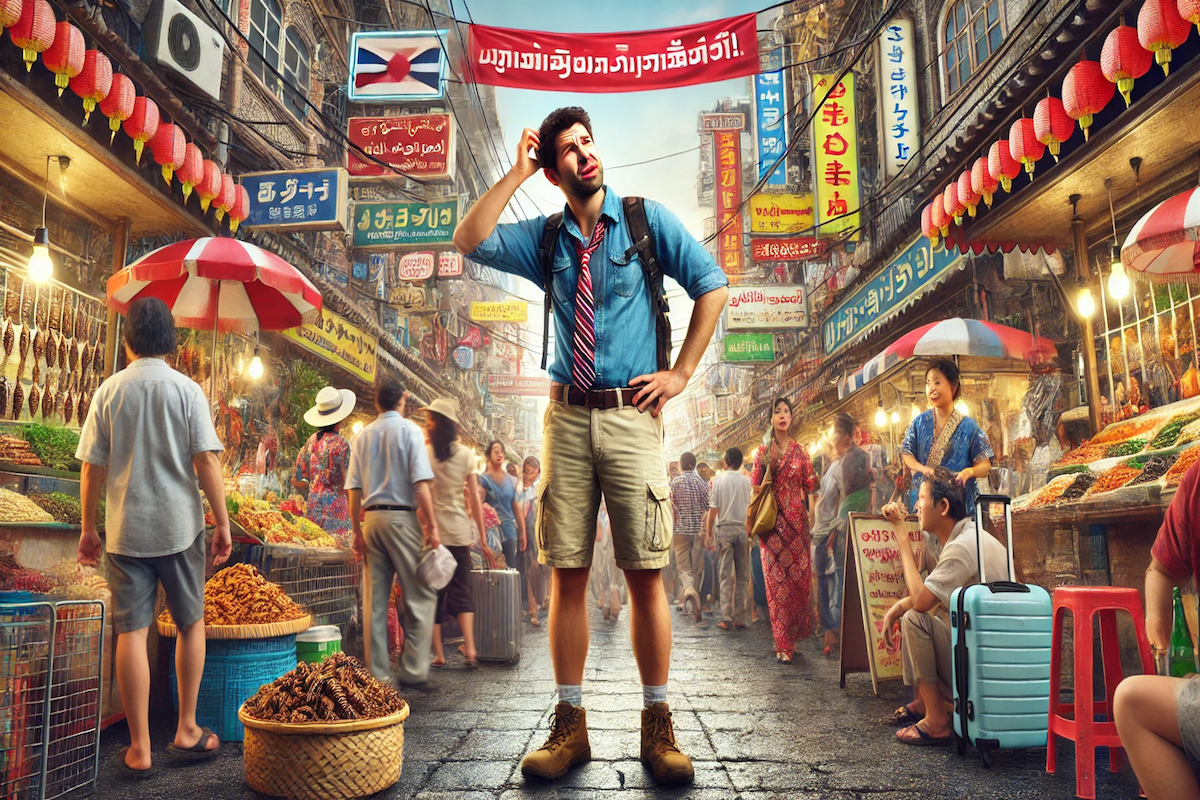Contents
- A Journey Through Cultural Quirks That Surprise Americans
- 1. Why So Serious? The Land of No Smiles
- 2. The British Tea Tango: Resistance Is Futile
- 3. The Siesta Shutdown: Where the World Stops at 2 PM
- 4. Where’s the Ice? Europe’s Quiet Rebellion Against Cold Drinks
- 5. Dutch Directness: When Brutal Honesty Hits Home
- 6. Pay to Pee: A Humbling Restroom Reality
- 7. Silent Suppers: The Quiet Joy of Japanese Dining
- 8. The Marathon Goodbye: When Leaving Takes Forever
- 9. No Tipping Allowed: The Generosity That Backfires
- 10. Scandinavian Personal Space: The Bubble You Don’t Burst
- Parting words: You’re Not in Kansas Anymore Dorothy, And That’s Half the Fun!
A Journey Through Cultural Quirks That Surprise Americans
Think you’ve got the world figured out? These hilarious cultural curveballs will have you questioning everything, especially your drink order!
Imagine stepping off the plane, passport in hand, ready to conquer the world.
You’re feeling confident, after all, what could be so different about life abroad?
Then, suddenly, a local frowns at your friendly smile, you’re served a drink without ice, and you find yourself paying to pee.
Welcome to the ultimate reality check for Americans traveling overseas, where the mundane becomes mystifying, and hilarity ensues.
1. Why So Serious? The Land of No Smiles
As an American, you’re used to smiling at everyone, whether it’s the barista, the mailman, or a passing dog.
But in countries like Russia or Finland, that same friendly grin might be met with a puzzled glare or outright avoidance.
Here, smiling at strangers isn’t a sign of goodwill, it’s often reserved for friends and family.
In Finland, for instance, smiling for no reason can be seen as insincere or, worse, a sign you’re up to something sketchy.
Ukrainians, on the other hand, prefer authenticity, if they smile, they mean it.
So, what’s an American to do?
Recalibrate your expectations and cherish those rare, genuine grins, they’re worth their weight in gold.
Next up, prepare to engage in a battle of politeness with the Brits.
2. The British Tea Tango: Resistance Is Futile
Picture this: you’re visiting a friend in the UK, and they offer you tea. “No, thank you,” you reply politely, thinking that’s the end of it.
Wrong.
“Are you sure? It’s no trouble at all. Go on, have a cuppa!” The relentless insistence continues until, inevitably, you find yourself holding a mug of tea you didn’t want, smiling awkwardly, and wondering how you lost this battle.
This isn’t just about tea, it’s about hospitality and politeness.
Refusing feels akin to rejecting their friendship. So, next time, just take the tea, it’s easier.

3. The Siesta Shutdown: Where the World Stops at 2 PM
You’re in Spain, wandering the streets of Madrid, ready to shop or grab a bite.
Then you notice a strange phenomenon: the streets are deserted, the stores are closed, and the bustling city has gone eerily silent.
Welcome to siesta, the sacred afternoon rest period.
While Americans thrive on productivity and 24/7 convenience, Spaniards prioritize balance and relaxation.
Businesses shut down for a few hours so employees can eat, nap, or spend time with family.
At first, the forced downtime feels frustrating, but lean into it, and you might just discover the joy of slowing down.

4. Where’s the Ice? Europe’s Quiet Rebellion Against Cold Drinks
You sit down at a charming café in Paris, order a Coke, and eagerly await its icy refreshment.
The server delivers it, and…no ice.
Just a bottle and a glass, the latter depressingly devoid of frosty cubes.
This isn’t neglect, it’s a preference.
Europeans argue that ice dilutes the drink’s flavor, and they’re willing to sacrifice chilliness for purity.
In some places, like Italy, you’ll be lucky to get a single, lonely cube.
It’s a small adjustment, but one that leaves Americans craving their ice-cold comforts.
Speaking of cool responses, the Dutch have their own unique way of keeping things…brutally honest.
5. Dutch Directness: When Brutal Honesty Hits Home
In the U.S., people are masters of euphemism and white lies. “You’re doing great!” might really mean, “You’re struggling, but we’re rooting for you!”
In the Netherlands, however, such sugarcoating is virtually non-existent.
Ask a Dutch person for their opinion, and be prepared for the unabashed truth.
“That’s a odd outfit,” or “Your idea won’t work” might sound harsh to American ears, but to the Dutch, it’s just efficient communication.
Though initially jarring, you’ll soon learn to appreciate their straightforwardness, it saves time, after all.
Now, let’s talk about the unexpected financial transaction you might encounter when nature calls.
6. Pay to Pee: A Humbling Restroom Reality
You’re out sightseeing, and nature calls. No problem, just find a restroom.
Except, when you do, there’s a turnstile and a sign demanding payment before entry.
In much of Europe and parts of Asia, public bathrooms aren’t free. The small fee (usually a coin or two) ensures cleanliness and maintenance.
While it feels absurd at first, you’ll have admit to yourself that the facilities are often spotless.
Next time you’re budgeting for a trip, don’t forget to allocate funds for bathroom breaks!
Now, prepare to hush up for mealtime in Japan.
7. Silent Suppers: The Quiet Joy of Japanese Dining
If American restaurants are a symphony of chatter, Japanese eateries are a meditation in silence.
Loud conversations over meals are rare, as dining is seen as a moment to savor the food, not fill the air with words.
One exception? Slurping noodles.
In fact, the louder you slurp, the more you’re signaling your appreciation for the meal.
It’s a paradox that confounds many Americans but also offers a glimpse into the art of mindful eating.

8. The Marathon Goodbye: When Leaving Takes Forever
In the U.S., goodbyes are efficient: a quick wave, a hug, and you’re out the door.
In Latin America, saying farewell is practically an Olympic sport.
Expect a flurry of hugs, kisses, and heartfelt exchanges that can stretch on for 30 minutes or more.
Each person gets their own individual goodbye, and rushing the process can be seen as rude.
It’s a heartwarming ritual that emphasizes relationships over convenience, but it might leave you wishing for a quick exit.
Now, let’s tackle the tipping paradox that trips up Americans in Japan.
9. No Tipping Allowed: The Generosity That Backfires
Tipping is second nature to Americans, but in countries like Japan, it’s not only unnecessary, it’s frowned upon and oftentimes, downright insulting.
Leave a tip, and your server might run after you, trying to return the money, thinking it was left by mistake.
Here, excellent service is the norm and included in the price, so tipping is seen as unnecessary or even patronizing.
Adjusting to this mindset takes time, but it’s a refreshing change from the guessing game of American tipping culture.
Finally, let’s dive into the invisible walls of personal space in Scandinavia.
In Sweden or Norway, standing too close to someone in public is a surefire way to make them uncomfortable.
If you think personal space is sacred in the USA, the Scandinavians take it to a whole new level.
For Americans accustomed to casual closeness and small talk, Scandinavia can feel isolating.
But respect their space, and you’ll quickly notice how calm and orderly everything feels.

Parting words: You’re Not in Kansas Anymore Dorothy, And That’s Half the Fun!
Traveling abroad is like stepping into a parallel universe where everyday habits turn into comedic jigsaw puzzles.
The key is to embrace the quirks, adapt to the differences, and laugh along the way.
You may even ask yourself, “Why don’t we do this back home?”
What’s the most baffling cultural habit you’ve encountered abroad?

David Peluchette is a Premium Ghostwriter/Travel and Tech Enthusiast. When David isn’t writing he enjoys traveling, learning new languages, fitness, hiking and going on long walks (did the 550 mile Camino de Santiago, not once but twice!), cooking, eating, reading and building niche websites with WordPress.


